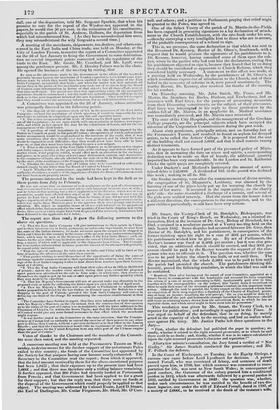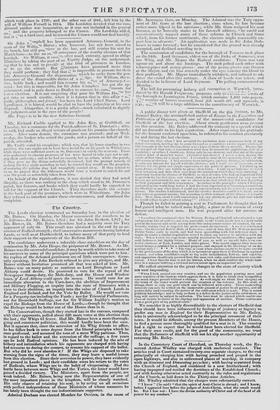" Resolved, That after basing read the report of your
Committee, appointed at a former Vestry to communicate a ith the honourable and reverend Dr. Grey respecting the return of a sum of money, amounting to 6281., inadvertently paid over to him, together with the correspondence on the subject, this Vestry deem it iucumbent on them to mark tlteir sense of the reverend gentleman's conduct on this insportant trans- action. Although the task be painful, the Vestry cannot on this occasion refrain from an exptession of their deep regret thin. a dignitary of the Church of England. posses- sing so large an income, forgetting the wise precept, • Do as you would be done by ;' and unmindffil of the just and honourable example furnished by his diocesan—should still insist on retaining money drawn from his necessitous flock, to which he has no equitable claim, and which never ought to have come into his possession."
This resolution was given by Mr. Smart, the Vestry Clerk, to a reporter for publication ; and accordingly it appeared in the Times. It was urged on behalf of the defendant, that in so doing, he merely acted in the capacity of clerk to the meeting, and had no malice what- ever against Dr. Grey. Mr. Justice Parke left three questions to the Jury-- " First, whether the defendant had published the paper in question ; se- condly, whether it related to the right reverend prosecutor, as to which he said there could be no doubt ; and, thirdly, whether it was in its nature calculated to injure the right reverend prosecutor's character and reputation?""
After° few minute's consultation, the Jury found a verdict of " Not Guilty." Sir James Scarktt conducted the prosecution ; and Mr. F. Pollock the defence.
In the Court of Exchequer, on Tuesday, in the Equity Sittings, a curious case catne before Lord Lyndhurst for decision. A person named Ferrell, who was convicted of felony, and sentence of death passed upon him, in 1799, but which sentence was commuted to trans- portation for life, was sent to New South Wales ; in consequence of good conduct, the Governor of the colony granted him a conditional pardon in 1812, which was afterwards followed by a general pardon in 1831, ratified by Government in 1833: the question was, whether, under such circumstances, he was entitled to the benefit of two dis- tinct legacies, one under the will of Edward Ferrell, dated in 1797, of a moiety of 2,0001., to be received at the death of the testator's wife, which took place in 1799; and the other one of 200/., left him by the will of William Fernell in 1814. His Lordship decided that the con- ditional pardon was inoperative, as it was not included in the general 0a,.s and the property belonged to the Crown. His Lordship added, that' it cats .a hard case, and he trusted tbe Crown would not deal harshly.





















 Previous page
Previous page